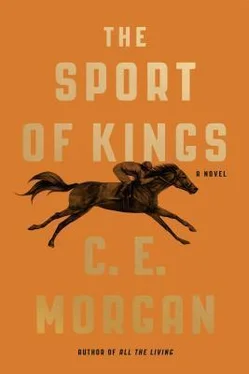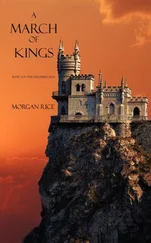She was beginning to cry. The Forge endurance was cold comfort, no comfort at all.
“Calm down now,” he said.
“I hate him.”
“Calm down, or you’ll hurt the baby.” And he laid a sunspotted hand over her flat belly.
She flung his hand away and stepped back, unsteady on her feet, nearly hissing as she spoke, “You better pray it’s not yours — don’t you know old seed produces weak plants?”
* * *
Now Henrietta finally cried. She cried as she had not even cried as a young girl when her mother left. She cried with such passion that she could barely manage the old slave staircase that led to the upper hall, at one point sagging like a broken, discarded doll against the banister, then sinking to her knees on the landing and sobbing in utter, encompassing sorrow. Until this moment, there had been some kind of hope that love would be requited like a priceless gift returned to the giver. But now that shadow hope was dead in the daylight while the fetus went about its triumphant business, not giving a damn. Her wails rang through the house, that colossus trophy waste dream cenotaph bore. She couldn’t find the strength to rise; she crawled pathetically on her hands and knees into her bedroom. But at the sight of her highboy, her old notebooks, her tattered books — remnants of the old life — the constriction of her clothing was too much. She tore her tank top over her head, she wrestled out of her jeans as if they were on fire, finally rising to get out of her underwear and socks and stumbling into her blindingly white bathroom naked.
She gripped the very real, very cold ceramic of the bathroom sink, but could not bring herself to look in the mirror. What now? Her actions were a mystery; she was a mystery. With anguish, she sensed that time’s blood had been merely passing through her seemingly discrete existence, her temporary form, and that when she was gone, time’s blood would flow dispassionately on. She was beginning to think she had spent her time badly.
Remember the old books, Henrietta? She recalled the private education of her youth, the one sought by her own insistent will, not the one forced upon her by her father. Think. Perhaps the very point of education was to discover the world beyond the self. Think, think, think … God, how she struggled to rope her discursive, selfish thoughts.
Her mind began to unfold like a late-summer blossom.
Within her, life was busy with its divisions and multiplications. But she knew that the machine, with its supposedly higher mathematics, only manufactured mystery. The principles of organization were still cloaked in darkness. She contained so much — so much, in fact, that she couldn’t contain it at all. How was it possible to live so many years in a body, not knowing yourself to be a small everything? She had been so busy consuming without digesting, absorbing what she wanted and shitting out the rest, too numb to see that her hair was streams, her bones stones, her breath humid weather, her heart soil, her veins endless waterways that coursed through the earth she walked upon. She should have spent more time looking not at the earth but at herself. Maybe she had known this once, but something, someone had driven her to bed on her back, where she could see only four white walls and a low white ceiling. Then somehow, she’d worked a self-deluding magic, deciding she had always wanted pleasure above all things, and had gone about it as men said you should, with abandon, never asking whether abandon was the mother of satisfaction. Who enjoys sex more? Why, Teresias, I say it’s the woman! Nine times more.
A little bit of strength returned, and she looked down out the window at the grassy paddocks with their horses, her father’s bucolic charms. Yes, she had been with men of all shapes and sizes, easing onto them, sliding with a timeless force, an urgency not even her own but nature’s, nature who she had always felt held a gun to her head. The men were reduced under her body to hard statuary, marble men with marble cocks until she was coming and in that nothing, the bliss of absolutelynothingandnoplace, where her father could not exist or ever have her, it didn’t matter what they were. That had seemed so easy. Yes, back then — was it only weeks ago? Twenty lifetimes ago? — back in the halcyon days of her ignorance, her monthly period had been only a nuisance. Her pussy like something she had invented — sui generis. There’s no business like my business! But, pregnancy shattered that illusion like so much cheap mercury glass. What differentiates man from animal is deferral of appetite. And here was the real silver that turned the blood blue: Each menstrual period was a bright reminder, a clotted remainder, a libation to the gods on behalf of every child unborn, those quietly waiting in the hidden place where the waiting gather. Woman was a tensile thing stretched taut between generations. So no fucking was casual and, further, there was no such thing as a free body in this world, our occasional choices laughably, infinitesimally rare. Each was born squalling and covered in blood with a bill coming due in her clenched hand, her tiny ovaries constellated with potential life, floating there in the warm, watery dark. The world, in fact, existed. She thought a woman’s body was then and now and forever beholden to an invisible First Cause — the unknown, unchosen, brute mistress, the goddess — yoked to it like a dumb, intractable mule, wrestling uselessly for freedom to the point of shredding its stubborn neck and letting its own blood in a vain effort to free itself, too ignorant to even know its name in the world: mule. A mule is not a hemlock is not a hame is not an ear of corn or a shot of bourbon, but a manifestation of fact called species: Equus mulus, a hybrid of the genus Equus of the tribus Equinii of the subfamilia Equinae of the familia Equidae, possessed of neither the sixty-two chromosomes of its ass father or the sixty-four of its horse dam, but a strange sixty-three, damned to a life of physical obligation through no fault of its own — a life of unmerited suffering, doomed once in a while to produce a little foal.
And yet … this was not exactly right. She was mired in self-pity, her conscience moving and wrestling within her like the baby soon would. She wasn’t crying now; she was dry-eyed. There was some poison in the pie; she wanted the treacly sweet of determinism with its aftertaste of martyrdom, but that came at too high a cost. Easy answers required a death of the mind. Yes, thinking was hard physical labor and nowhere near as pleasurable as sex, so she had abandoned it long ago. That was the pitiless truth. All the distractions of workaday life were so much easier than thinking, because thinking’s consequence — belief — made unceasing and terrible demands. It spoiled every pleasure. Yet, to live with half a mind, lobotomized in the peerless world, was to be a dead woman walking.
What she finally knew was shocking, even ugly in its power, but it brooked no equivocation. She took the leather strap between her teeth and sensed that she would survive the sawing off of an old, diseased limb. All of her life she had imagined herself a slave to a body she hadn’t acquired by choice, but this was only half the truth. Nature had never overridden her will. The gene is not the judge, only the court reporter. Or further: The gene is the prisoner trapped in an organism, which can reason and plan. She, Henrietta, had made many, many choices. Her body was female, but she was never a slave. Never that. She had only imagined herself so.
* * *
And now, poor Henry — the victory should have been his! This was the triumphant first month in the busy factory of his daughter’s womb. Yet he couldn’t discover an easy satisfaction. He listened to Henrietta’s animal howls on the stairs, and his ears bloomed with home blood. A worrisome worm wriggled: What if the child was, in fact, not his? An unfamiliar, seizing sensation took up residence around his organs. He realized it was simple fear. What if it was not Henrietta but Henry himself who was under harness and curb? No, no, no — he knew that the great machinery of life, the mechanical divisions in her wailing wall, the water sac and the placenta emerging as globs of cell and the splashing of three translucent layers, had been set in motion by himself alone. His daughter was manufacturing not her own fresh, originating dawn horse, and certainly not a dark Barb, but a pure Thoroughbred, the line of which could be traced back generation by generation through the age-old stud book.
Читать дальше
Конец ознакомительного отрывка
Купить книгу












